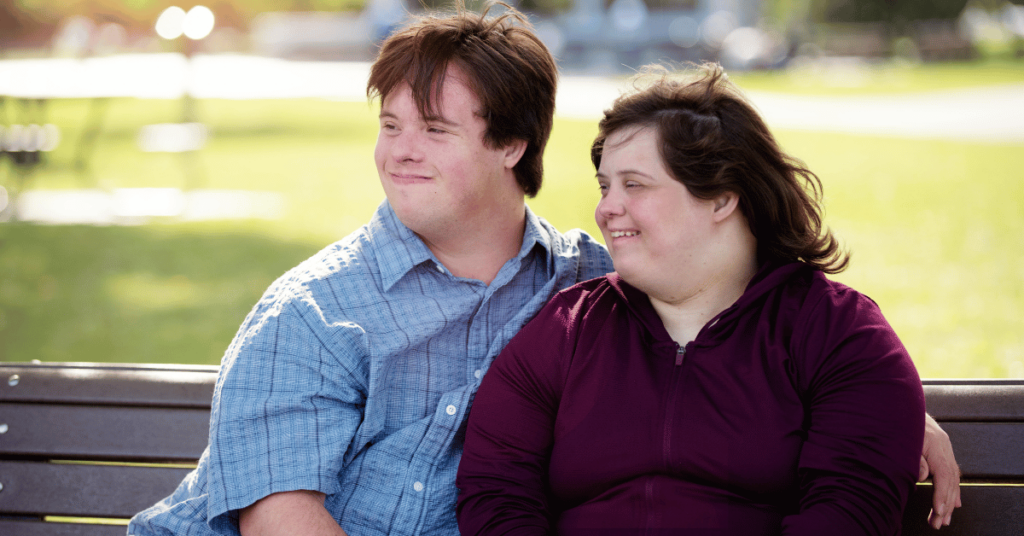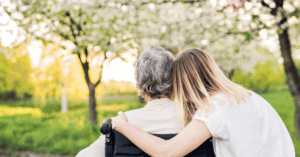Individuals with Down syndrome bring warmth, authenticity, and joy into our lives. They are often known for their cheerful, friendly, and kind nature, as well as their wonderful sense of humor and zest for life—qualities that make them truly endearing. Down syndrome results from an extra copy of chromosome 21, leading to physical and developmental differences. However, with the right support, individuals with Down syndrome can lead fulfilling lives, embracing their unique strengths while navigating mild to moderate intellectual disabilities.
Sadly, however, because individuals with Down Syndrome have an extra copy of chromosome 21, this puts them at a higher risk for developing Alzheimer’s disease, a common form of dementia. Chromosome 21 carries the gene responsible for producing amyloid precursor protein (APP). Overproduction of APP leads to the accumulation of amyloid-beta plaques in the brain, a hallmark of AD pathology.
Understanding the early signs of dementia in people with DS is crucial for timely diagnosis and intervention, which can significantly impact the quality of life for affected individuals and their families.
Early Signs and Symptoms
Memory loss, a common early symptom in the general population, may not be as prominent in individuals with DS. Instead, early indicators may include:
- Changes in Behaviour and Personality
Individuals with Down syndrome may start to exhibit increased irritability, stubbornness, or withdrawal from social interactions. (Alzheimer’s Society, n.d.). For example, a person may become easily frustrated with small changes in routine. They can exhibit resistance or defiance with daily tasks such as dressing, bathing, or eating.
- Diminished Social Engagement
An individual who once enjoyed chatting with friends and family about their day or sharing stories about their interests may begin to remain silent or respond minimally when spoken to. They might decline invitations to social events they used to enjoy, such as birthday parties or outings, preferring to stay in their room or avoid group settings.
- Emotional Disturbances
Symptoms such as sadness, fearfulness, anxiety, increased restlessness, and sleep disturbances may emerge. They might experience difficulty sleeping, waking up frequently during the night, or exhibiting signs of restlessness during the day, such as pacing or fidgeting.
- Seizures
The onset of seizures in adulthood, particularly new or increased seizure activity, can be an early sign of dementia in individuals with DS. (Alzheimer’s Association, n.d.). For example, a person who has not experienced seizures before might suddenly begin having them, or the frequency of seizures they have had in the past could increase. These seizures may appear as brief lapses in awareness, shaking, or stiffening of the body.
- Motor Function Decline
Changes in coordination and gait, including increased “clumsiness” or unsteadiness while walking, may be observed. They may stumble more frequently, have trouble getting up from a chair, or appear unsteady when walking short distances, even on flat surfaces.
These symptoms can be subtle and may be mistakenly attributed to the natural aging process or existing intellectual disabilities. Therefore, it’s essential for caregivers and healthcare providers to monitor for changes relative to the individual’s baseline functioning.
Managing Dementia Behaviours for Individuals with Down Syndrome
Managing dementia-related behavioural changes requires different approaches for individuals with Down syndrome (DS) compared to those without.
- Understanding Baseline Behaviours
For those with DS, caregivers must be familiar with the person’s usual cognitive and social behaviours, as changes may be more subtle and harder to identify. Keep a daily log to track any shifts in behaviour and look for patterns that differ from the person’s typical responses.
- Adapting Communication
When an individual with DS is having difficulty communicating, caregivers might use a picture board or a visual schedule to show upcoming activities or meals. Additionally, caregivers can offer choices rather than open-ended questions to make communication easier for someone with DS. For example, instead of asking, “What do you want to do today?” a caregiver might ask, “Do you want to go for a walk or have lunch now?“
- Managing Behavioural Responses to Stress
Individuals with DS often respond to stress with heightened repetitive actions, such as hand-flapping, rocking, or repeating phrases. Therefore, it’s important to provide a calm, predictable environment and minimize disruptions in their daily routine. Create a quiet, safe space where they can retreat if overwhelmed, and use calming techniques such as soft music or weighted blankets.
Delirium and Down Syndrome
Individuals with Down syndrome (DS) and dementia may experience delirium, but its symptoms can be harder to detect, as the person may struggle to communicate and behavioural changes could be misinterpreted as part of their baseline.
Recognising even subtle shifts from their usual patterns is essential for early detection and timely intervention. Any deviation, even minor, could indicate underlying issues such as infection, pain, or dehydration, all of which can precipitate delirium.
Early recognition and intervention are vital, as untreated delirium can lead to increased morbidity and accelerate cognitive decline. By closely monitoring baseline behaviours, caregivers can play a pivotal role in ensuring the well-being of individuals with DS and dementia.
Caregivers as the Frontline Experts and Champions in Dementia Care
The quality of life for individuals with Down syndrome and dementia is closely tied to the care they receive. More than advocates, caregivers are essential educators, guiding others in the caregiving team. By sharing their insights, they foster understanding and collaboration, ensuring that care remains person-centred and effective.
Their intimate knowledge of the individual makes them experts on a level that matches healthcare professionals. This deep knowledge enables them to recognise even the smallest changes—whether it’s a shift in mood, a decline in social engagement, or increased confusion. Physicians and other care providers depend on the insights caregivers offer to inform treatment and ensure the best care possible.
Caring for someone with dementia and Down syndrome is a community effort, and caregivers play a pivotal role in that team.
At Dementia Solutions, we’ve made it our mission to demystify dementia behaviour and continue to explore person-centred, creative, non-pharmacological solutions to manage dementia-related behaviours. We believe that awareness creation and skill-building through education is the most effective and powerful tool we have to promote and maintain the well-being of both the person with dementia and their caregiver.
If you’re a professional caregiver, consider becoming a Certified Dementia Care Provider!
Ready to deepen your understanding and be confident in your skills in managing changed behaviours due to dementia? Register for our Certified Dementia Care Provider program today and learn how to communicate with compassion, navigate challenging behaviours, and provide the best care for individuals living with dementia. Gain the tools you need to make a meaningful difference in the lives of those you care for. Sign up now and start transforming your caregiving approach!
If you’re a Family Caregiver, we invite you to join our Dementia Solutions Family Membership!
As a family caregiver, you don’t have to navigate the challenges of dementia alone. Join our Dementia Solutions Family Membership today and gain access to expert guidance, practical tips, and a supportive community of caregivers just like you. With resources, real stories, and valuable tools, we’re here to help you provide the best care while maintaining your well-being. Sign up now and take the next step toward confident, compassionate caregiving!
Any questions, simply send us an email at Info@DementiaSolutions.ca , and we’ll guide you through everything our programs have to offer. We look forward to helping you take the next step in your caregiving journey!
If you need support in your caregiving experience or would like to learn more about our educational opportunities, please reach out to us at Info@DementiaSolutions.ca and we would be more than happy to support you.
DISCLAIMER:
The contents of this blog are provided for information purposes only. They are not intended to replace clinical diagnosis or medical advice from a health professional.



